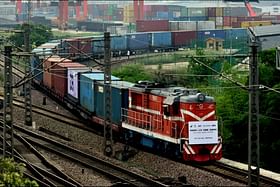This transition brings economic and eco-friendly benefits, allowing for cost-effective and efficient transport of vehicles through the use of railway rakes.
Automakers in India, including market leader Maruti Suzuki, are adopting alternative transportation methods beyond roadways to transport their finished vehicles in an effort to curb emissions and cut costs, especially with the significant increase in fuel prices.
According to Economic Times report, railway transportation for passenger vehicles has increased in India, now comprising over 20 per cent of the market from just 4.5 per cent in 2018.
This transition brings economic and eco-friendly benefits, allowing for cost-effective and efficient transport of vehicles through the use of railway rakes.
Industry experts suggest that this method is advantageous for smoothly transporting multiple vehicle batches at once. Railway transport helps automakers reach distant places in half the time than by road.
With terminals in Agartala and Silchar, they can deliver vehicles to Northeast India in around eight days, half the usual time of 16 days.
According to Rajesh Menon, the director-general of industry body Society of Indian Automobile Manufacturers (SIAM), the modal share of railways in overall vehicle transportation has increased in the auto industry, as railways have become more efficient over the years, especially for distances over 1,000-1,200 km.
He stated, “As per our estimates, 4.5 per cent of new passenger vehicles manufactured in India were being transported through railways in 2017-18, while it grew to about 20 per cent by 2021-22”.
The railways have developed siding infrastructure at various auto-manufacturing units to address last-mile connectivity problems.
Additionally, they have increased the number of rakes to cater to the growing Auto Industry demand, according to him.
Last year, Maruti Suzuki achieved its highest number of units dispatched through railways at 335,245, which was almost a 43 per cent increase from the previous year.
The car company plans to further increase its rail transportation and has set a goal to move an additional 100,000 vehicles annually via rail in the coming years.
Maruti Suzuki’s executive officer Rahul Bharti said over the past few years, the company had been undertaking several measures to increase the focus on green logistics.
To achieve their goal, the company plans to shorten distances for dispatches, utilize railway rakes, and integrate digital planning for dispatches.
Apart from Maruti Suzuki, Transport Corporation of India, APL Vascor, Adani NYK, IVC Logistics and Joshi Konoike Transport & Infrastructure have also secured AFTO (Automobile Freight Transport Operator) licences to cash in on the potential in the space.
In 2018, the railways aimed to attract private investors for special wagons by loosening the AFTO policy.
The registration fee was lowered from Rs 5 crore to Rs 3 crore and the mandatory procurement of three rakes was reduced to one, as per report.
The railway company currently has 119 rakes for transport of automobiles, both public and private, as compared to only 19 in FY18.


